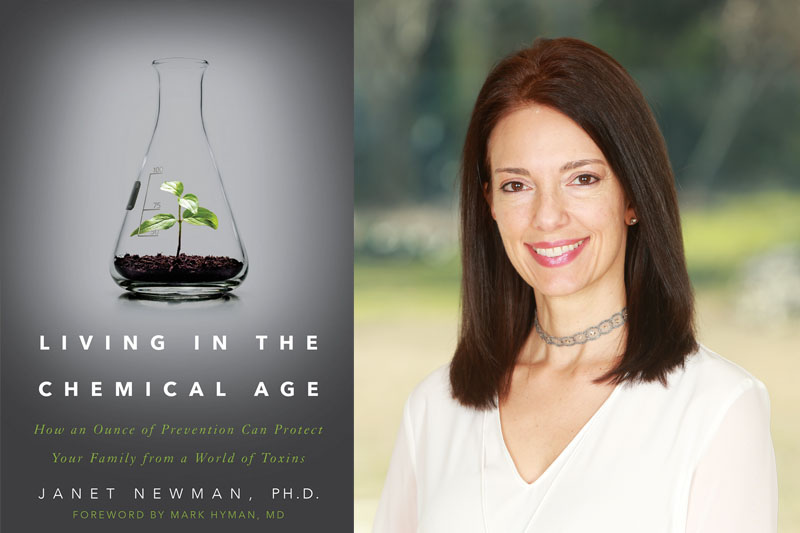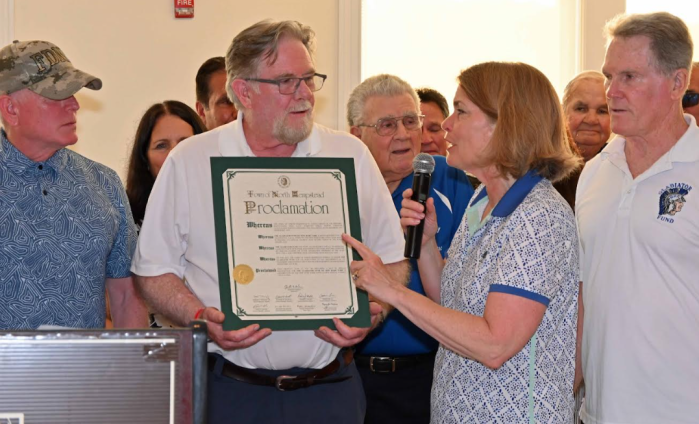 Author discusses health challenges in Living In the Chemical Age
Author discusses health challenges in Living In the Chemical Age
Janet Newman, PhD, is truly passionate about health and wellness. Her longtime interest in the topic has led her to understand the importance of maintaining a clean environment in the body, both internally and externally.
“I want to help people be the best possible versions of themselves,” said Newman. “I can honestly say that being a mom is the most gratifying role I’ve ever had, and about eight years ago, I began experiencing a lot of health challenges, both personally and with other members of my family.”
Being the researcher that she is, Newman dug into the data on all of these health challenges and began realizing that each one of them was either caused by or exacerbated by toxins. It was this moment that began her journey into researching toxins and eventually writing the book Living in the Chemical Age.
 Why did you feel a need to create Living in the Chemical Age?
Why did you feel a need to create Living in the Chemical Age?
 I wrote this book because I want to inform people about the many toxins in our environment, and how we can avoid them, so that they can feel empowered to make healthier choices with their food, water, air quality, personal care products and pharmaceuticals.
I wrote this book because I want to inform people about the many toxins in our environment, and how we can avoid them, so that they can feel empowered to make healthier choices with their food, water, air quality, personal care products and pharmaceuticals.
We have a huge problem with chronic illness in America and I believe that our constant exposure to toxins is largely to blame. My readers learn how to decrease their toxic exposure with simple, easy to follow tips so they can lower their chances of becoming chronically ill.
 How has the environmental and climate landscape changed in terms of how we take care of our planet?
How has the environmental and climate landscape changed in terms of how we take care of our planet?
 The last few generations have become very irresponsible with our planet. We don’t have a “planet B” to move to, so it is our collective responsibility to care for the only Earth we have. When I see the five enormous garbage patches in our oceans, filled primarily with plastic waste, the air pollution that blankets our cities, our coveted national parks and even our once pristine polar ice caps, or the toxic insecticide use that is causing the disappearance of our honeybee colonies, it is depressing.
The last few generations have become very irresponsible with our planet. We don’t have a “planet B” to move to, so it is our collective responsibility to care for the only Earth we have. When I see the five enormous garbage patches in our oceans, filled primarily with plastic waste, the air pollution that blankets our cities, our coveted national parks and even our once pristine polar ice caps, or the toxic insecticide use that is causing the disappearance of our honeybee colonies, it is depressing.
One of these atrocities would be bad enough, but unfortunately, these examples are just the tip of the iceberg, so to speak. Our society has become so addicted to convenience and instant gratification, that we often don’t think about how our actions will affect future generations.

 What are the most common chemicals in our food and water?
What are the most common chemicals in our food and water?
 In our food, we need to be concerned about the numerous pesticides and herbicides used on all of the crops that aren’t grown organically. For instance, glyphosate is the most commonly used agricultural chemical in the U.S. and has been linked to cancer. We can’t just wash this stuff off so it is important to buy organic produce and grains as often as possible.
In our food, we need to be concerned about the numerous pesticides and herbicides used on all of the crops that aren’t grown organically. For instance, glyphosate is the most commonly used agricultural chemical in the U.S. and has been linked to cancer. We can’t just wash this stuff off so it is important to buy organic produce and grains as often as possible.
We also need to be concerned about the hormones and antibiotics that are given to factory farmed animals, as they wind up in our conventional meat and dairy products. Consuming too many antibiotics contributes to antibiotic resistant bacteria. Our water may contain chemicals such as lead, chromium-6, fluoride, chlorine, chloramine, 1,4-dioxane, and a variety of pharmaceutical drugs.
The only way to know what you’re drinking is to have your water tested. My recommendation is to use a good reverse osmosis filtration system…or unfortunately, your body becomes the filter.
 What five easy tips can you offer people to live healthier? Tips they can start right now.
What five easy tips can you offer people to live healthier? Tips they can start right now.
 Read ingredient labels.
Read ingredient labels.
If there is an obscure ingredient that you can’t pronounce, look it up. Decide if you want to ingest or apply that to your body.
Become familiar with the Dirty Dozen.
The Dirty Dozen is a list of conventional produce to avoid, per the Environmental Working Group (EWG.org). These 12 fruits and vegetables are known to be the most contaminated with pesticides, with strawberries and spinach being the worst on the list. Choose the organic form of these items instead.
Stop buying plastic bottles of water.
Besides being an environmental nightmare, plastic bottles are made from PET, an endocrine disrupting chemical, that can leach into your water and negatively affect your hormones.
Search for an eco-friendly dry cleaner.
Eco-friendly dry cleaners don’t use PERC, a chemical that has been classified as a likely human carcinogen. PERC off gasses and can cause respiratory problems and damage to the central nervous system.
Be aware of the term “fragrance.”
“Fragrance” appears on the label of many cleaning products and personal care products. That one word is a catch-all term for proprietary formulas that can contain up to 100 different ingredients, and some of those could be toxic. Buy unscented products or those scented with essential oils instead.
 Do you think technology helps or hinders how we can live healthier lifestyle? Why?
Do you think technology helps or hinders how we can live healthier lifestyle? Why?
 Technology can both help and hinder our desire for living a healthier lifestyle. For instance, we are so fortunate to have information technology at our fingertips. And things like imaging tools or prosthetic limbs have saved and improved numerous lives. However, I often think that we have let our imaginations get the best of us without extrapolating all of the possible negative scenarios.
Technology can both help and hinder our desire for living a healthier lifestyle. For instance, we are so fortunate to have information technology at our fingertips. And things like imaging tools or prosthetic limbs have saved and improved numerous lives. However, I often think that we have let our imaginations get the best of us without extrapolating all of the possible negative scenarios.
For instance, I discuss antibiotics in my book. They are wonderful life saving medicines that were created to help people overcome bacterial infections. However, what began as a medicine to be used judiciously, soon became vastly overused in our livestock and often misused for things like viral infections. This has caused us to enter into an era of antibiotic-resistant bacteria, where it is feared by many scientists and doctors that we will not have the necessary antibiotics to fight off critical infections.
 Why should someone read Living in the Chemical Age?
Why should someone read Living in the Chemical Age?
 One in two men and one in three women will be diagnosed with cancer at some point in their lives. About 50 million people have an autoimmune disorder. One in 68 children have autism. Almost half of all Americans are either diabetic or pre-diabetic. If these statistics bother you, then you will want to read Living in the Chemical Age.
One in two men and one in three women will be diagnosed with cancer at some point in their lives. About 50 million people have an autoimmune disorder. One in 68 children have autism. Almost half of all Americans are either diabetic or pre-diabetic. If these statistics bother you, then you will want to read Living in the Chemical Age.
Now, more than ever before in our history, we are inundated with toxic, manmade chemicals in our food, water, air, cleaning products, personal care products and pharmaceuticals. These chemicals just didn’t exist 100 years ago. We have 85,000 chemicals on the market today and only a few hundred have ever been tested for safety. Some are proving to be neurotoxic or endocrine disruptors. I believe most of us are taking in more toxins than we’re able to excrete on a daily basis, and our bodies are struggling to keep up with the constant bombardment. And as a result, we’re getting sick with these devastating diseases.
Living in the Chemical Age will tell you where these chemicals are lurking, how they affect the body, and most importantly, how to avoid them and protect your family.
Janet Newman has a PhD in psychology and a master’s degree in social work. She is the mother of two active boys and enjoys organic gardening, writing, yoga, bike riding, and cooking healthy meals for her family.
To purchase Living in The Chemical Age, visit Amazon.com.


































